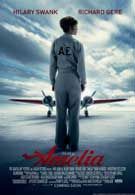A good biopic can help moviegoers know what it is like to be someone extraordinary, invite them into the private life of an important public figure, or at bare minimum, take an interesting perspective on a well-known life. Amelia does none of those things, instead opting to be an over-simplified version of Amelia Earhart's complicated life, suffocated by glossy cinematography and a lush score and boasting a cast full of actors who seem to believe that playing people who lived in the past, even just 80 years ago, requires affectations that make them all sound like newsreel announcers.
You may as well be watching a slideshow about Amelia's Greatest Hits, for all the insight that comes out of Mira Nair's impeccably detailed and impossibly dull film. She flies across the ocean as a passenger, she flies across it solo, she gets married, she cheats, she disappears-- each event is ticked off as if in a book report, with the film never pausing to see her as anything other than the strong-willed icon, or examining what must have been a thought or two behind the million-watt smile.
As Amelia, Hilary Swank looks the part but doesn't go much deeper than that, with half her lines sounding like aphorisms even in intimate moments ("I want to be a vagabond of the air!" she proclaims at the breakfast table) and, even when she claims to be upset or frustrated, never losing the poise that made Earhart a public icon. Richard Gere plays her husband, George Putnam, the publisher who effectively acted as Earhart's agent as he helped turn her into a star, but by this film's account at least, seems to have deeply loved her as well. And showing up late in the game to create a weak love triangle is Ewan McGregor as Gene Vidal, an aviation pioneer whose little boy Gore (William Cuddy, cloying) hovers around the edges of nearly all his stolen moments with Earhart.
The miracle of flight, the strange freedom and weightlessness of it, was apparently the key element of Earhart's fascination with the skies, her constant willingness to risk her own life and undertake dangerous journeys. But the flight scenes in Amelia simply feel like we're rattling around inside a box with Swank, no matter how genuine her barks of joy sound when she sees the Irish coast on the horizon. Beautiful landscape shots still fail to bring a sense of place to any of the exotic locales she visits, and though Swank apparently earned a pilot's license for the role, the technical, challenging aspects of flight are entirely left out.
The one exception is Earhart's final flight with navigator Fred Noonan (Christopher Eccleston, the only person in this movie talking like a real person), as they struggle to find tiny military base Howland Island in the middle of the vast Pacific. We witness not only their unheard, increasingly frantic broadcast to the sailors on the base, but the sailors themselves, struggling in vain to locate the famous aviator. Noon prays in the backseat while Earhart, ever determined, keeps broadcasting and searching; Nair cuts away tastefully, and probably because we really have no idea what happened, but the panic and doom of the scene are potent. My guess is as good as yours as to why they couldn't capture the similarly powerful feelings of joy and relief in the more successful flight scenes.
One redeeming element, like a great lead performance or a scene or two of real authenticity, would have turned terrible movie into a merely boring one. But every opportunity to turn Amelia into a real person, or to bring any real life to a movie about facts and accomplishments, is ignored in favor of touching up this glossy, utterly stillborn portrait of someone who seems like she'd be interesting, if we were ever actually given the chance to get to know her.
Staff Writer at CinemaBlend
Most Popular




